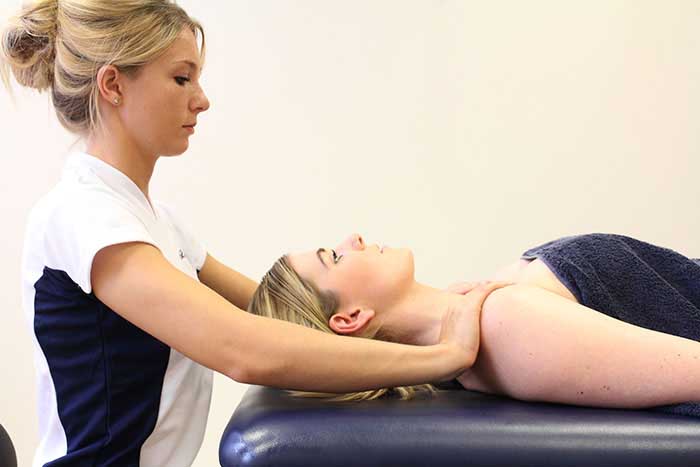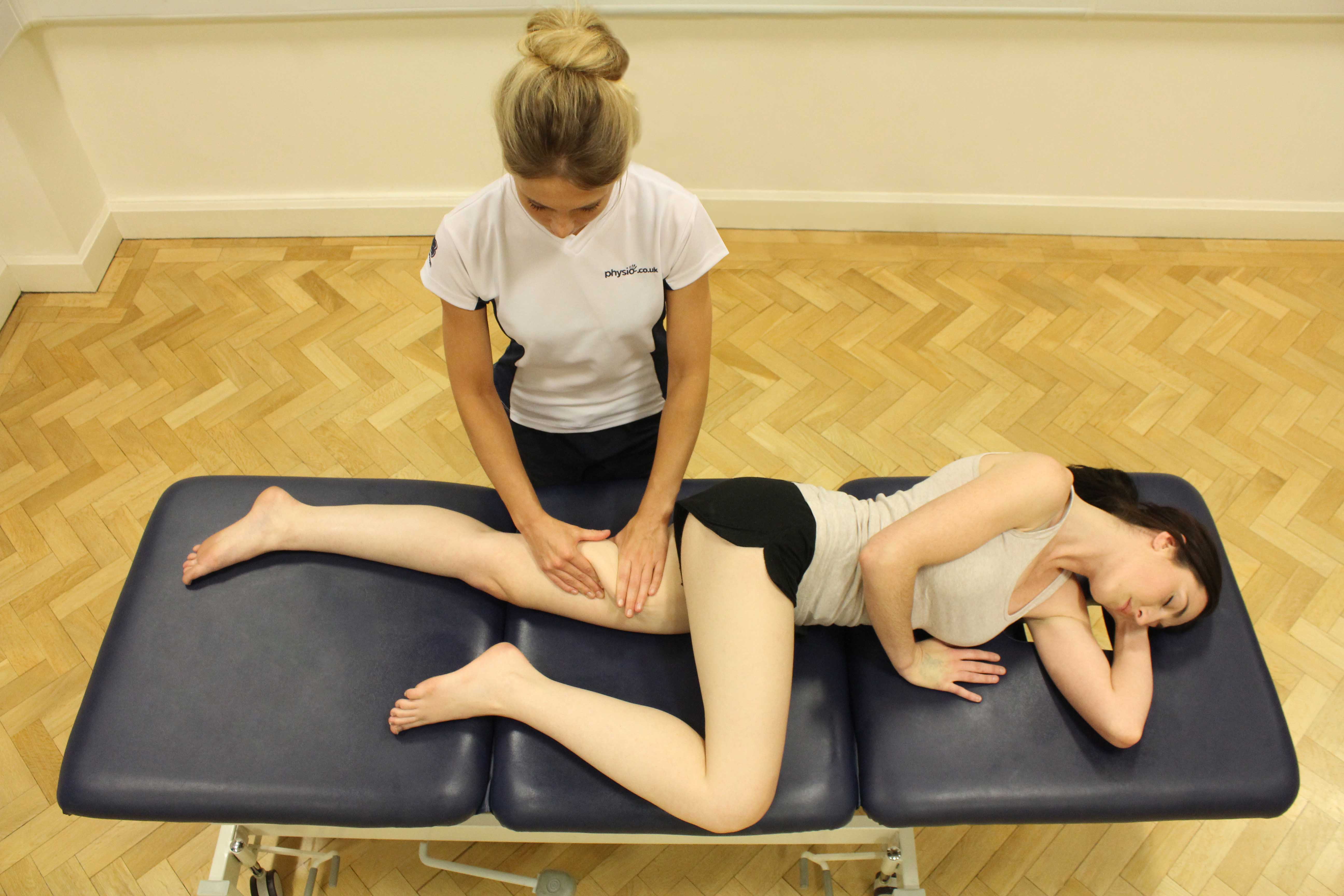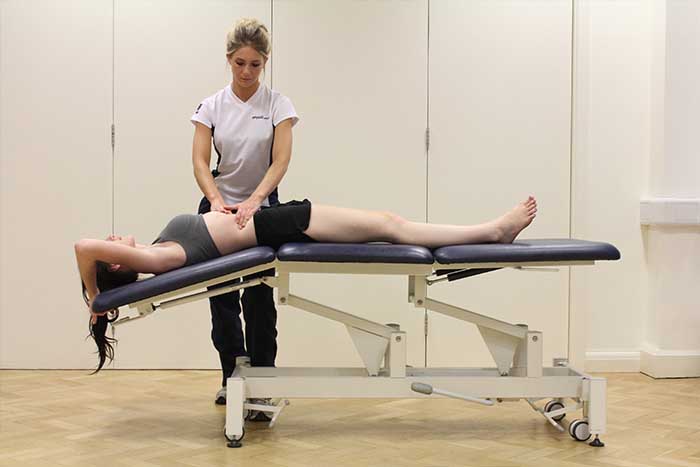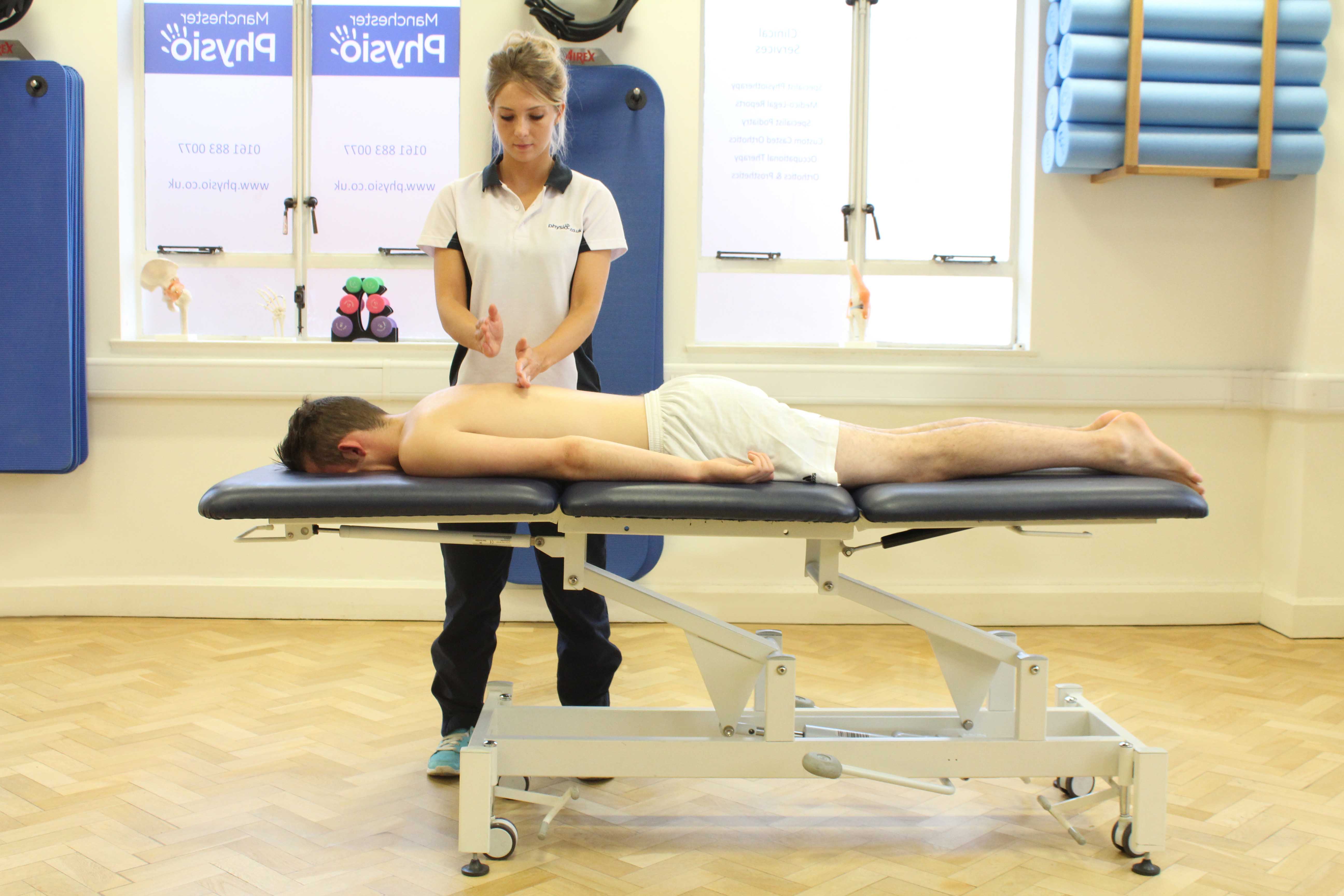Massage has both physiological and emotional responses. A physiological response to massage is the effect it has on the musculoskeletal system. An emotional response to a relaxing massage is the feeling of relaxation and a sense of calmness. Massage relaxes the body by increasing blood circulation and releasing endorphins. Endorphins are released from the brain that produce a feeling of happiness and well-being. Our massage therapists working at Physio.co.uk provide massage therapy services to provide relaxation as part of a treatment.
What type of massage is used for relaxation?
There are many types of massage that can be used to help to promote relaxation. The types of massage used for relaxation are:

When can massage help relaxation?
Massage can help promote relaxation in many circumstances. These circumstances include:
 Above: Rolling massage technique of adductor magnus and semimembranosus muscle for relaxation
Above: Rolling massage technique of adductor magnus and semimembranosus muscle for relaxationMassage is an effective treatment to help reduce stress. Stress is a physical and emotional response in the body. Stress can affect the way you feel, think and how your body works. Stress is caused by an increase of stress hormones in the body including adrenaline and cortisol. Many different types of massage can help relax the body and reduce stress. Massage helps decrease stress by increasing temperature of the soft tissues, increasing feel good hormones and reducing stress hormones. Massage helps muscles to relax and promote feelings of calmness, content and happiness.
Massage also helps reduce tight muscles in the body. Tight muscles can occur for many reasons. The most common reasons for tight muscles are poor posture and emotional stress. Standing, sitting or lying with poor posture produces tension or load on the muscles. When a muscle is loaded, it naturally resists the load by contracting to overcome the demand. Receiving a relaxing massage can help reduce tightness in the muscles. Massage helps by increasing temperature, blood circulation and helping to break down adhesions.
Relaxation massage is used to help treat people with high muscle tone. High muscle tone is an increase of tension in the muscles when at rest. Increased tone in the muscles can feel tight, tense and lead to pain. Muscles with high tone are reduced in blood and produce less movement. Massage helps high muscle tone by restoring blood circulation and promoting a relaxation response in the muscles. Massage also helps by relieving tension in the muscles due to a build-up of waste products. Massage helps to reduce congestion knotted fibres in the muscles.
Massage is a beneficial treatment to receive before a sporting event to help relax a person both physically and mentally. Relaxing the body before an event can be important to help maximise performance. Massage relaxes the body by increasing temperature of the soft tissues and releasing hormones. By encouraging relaxation in the body, emotions such as anxiety and stress are reduced. The beneficial effect of muscles relaxing can also contribute to joint mobility. When muscles relax, joints are able to move in full range of movement.

What are the physiological effects of receiving a massage for relaxation?
Massage can produce many important physiological effects on the body. The physiological effects of massage to help relaxation are:
 Above: Percussion massage of latisimus dorsi for relaxation
Above: Percussion massage of latisimus dorsi for relaxationA relaxing massage increases temperature of the soft tissues. Massage increases temperature in the body by applying friction against the skin. Increased friction stimulates the increase of vasodilation. Vasodilation is the widening of blood cells. Widening of blood cells allows more blood to be passed through muscles. An increase of temperature and blood flow stimulates a deep relaxation response in the body. The physiological effect slows the rate of breathing and decreases heart rate allowing the body and muscles to relax.
A physiological effect of a relaxing massage is the increase of hormones. Feel good hormones such as endorphins, serotonin and dopamine are stimulated in the brain and released into the body. An increase of these types of hormones is produced as the body relaxes and the parasympathetic system is stimulated. Increased endorphins, serotonin and dopamine promote emotions such as calmness, a sense of well-being and happiness.
A relaxing massage also helps decrease the cortisol hormone in the body. Cortisol is a stress hormone that is increased when the body senses danger or worry. Relaxing the body can help decrease the number of cortisol hormones from the brain. Emotions such as stress and anxiety are reduced and replaced with relaxation and happiness.

What are the benefits of receiving a massage for relaxation?
Massage for relaxation has many benefits. The benefits of massage for relaxation include:
A relaxation massage can help decrease tension in the muscles. Muscle tension is a semi-contracted state in which a muscle is extended over a period of time. Muscle tension can be the cause of physiological effects and can lead to tightness and muscle pains. Stress can change the body's nervous system and reduce blood flow to the soft tissues. The lack of blood and oxygen to tissues in the body can build up as waste products resulting in muscle tension. Massage can help increase blood circulation to the soft tissues and reduce contraction in the muscles.
Relaxing massages are beneficial to reduce stress. Stress can have an emotional and physical effect upon the body. Stress can lead to muscle tension, fatigue and bad mental state. A massage helps reduce the feeling of stress by increasing the temperature of soft tissues and increasing the release of positive hormones. Increasing temperature can help relax the soft tissues in the body and relieve tension. Massage also helps to stimulate the release of positive hormones from the brain which decrease the amount of stress hormones being released. The feeling of stress is commonly replaced with emotions such as content, calmness and happiness.
Receiving a massage to relax can also benefit to help maximise performance. Relaxing massage techniques are used within a pre event massage to help relax a person before an important performance. Relaxing the body before an event can help reduce tightness in the muscles, increase range of movement around joints, decrease stress levels and help focus on the task in hand.
Summary
A relaxing massage can help the body physically and mentally. The most common types of massage to help relax the body are therapeutic, Swedish and remedial. Massage to relax can be used to help on many occasions. Receiving a massage helps relieve stress, tight muscles, reduce high muscle tone and pre sporting event. Massage also produces a number of physiological effects on the body including increased temperature, increased feel good hormones and decreased cortisol. Massage therapists working at Physio.co.uk provide massage therapy services to provide relaxation as part of a treatment.
How can I arrange a massage to relax?
The easiest way to arrange a massage for relaxation at Physio.co.uk is to email us at office@physio.co.uk or call us on 0800 033 7800.
You can also book an appointment online and save £10

 0330 088 7800
0330 088 7800



































